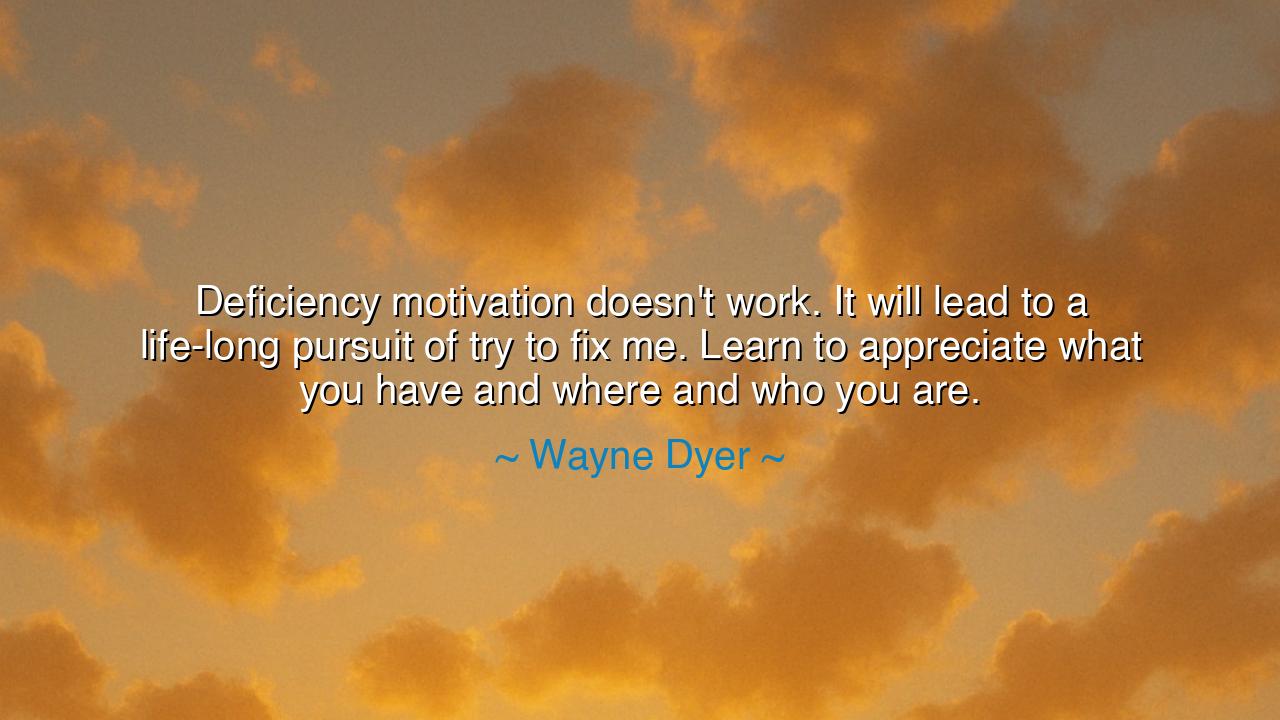
Deficiency motivation doesn't work. It will lead to a life-long
Deficiency motivation doesn't work. It will lead to a life-long pursuit of try to fix me. Learn to appreciate what you have and where and who you are.






“Deficiency motivation doesn’t work. It will lead to a life-long pursuit of try to fix me. Learn to appreciate what you have and where and who you are.” — Thus spoke Wayne Dyer, the sage of the modern spirit, whose voice called mankind away from the prison of self-criticism and toward the temple of self-acceptance. His words are not a mere warning but a revelation — that the endless striving to “be enough” is a shadow that haunts the human heart. Deficiency motivation, he calls it — the restless hunger that drives people not from joy, but from lack. To live in that hunger is to walk an infinite road of dissatisfaction, where no success brings peace, and no achievement quiets the voice that whispers, “You are still not whole.”
To understand this truth, one must first know the nature of deficiency motivation. It is the force born of fear — the belief that we must earn our worth, that we are incomplete until the world approves of us. It is the builder of masks and the thief of rest. The man who lives by deficiency wakes each morning already behind, chasing something undefined. He works not because he loves his craft, but because he fears his inadequacy. He loves not because his heart overflows, but because he seeks validation. Yet, as Dyer warns, this path has no end — for the void it seeks to fill cannot be satisfied by external things. The pursuit becomes a life-long attempt to fix what was never broken.
In contrast, the wise learn the art of appreciation — the ability to see beauty not in what is missing, but in what is. This is not complacency, but awakening. To appreciate who you are is to stand in the present moment with reverence, knowing that you are already part of something divine. From this wholeness comes true growth — not growth born of deficiency, but of abundance. When one acts from fullness, every effort becomes an act of joy; when one acts from emptiness, even triumph tastes hollow. Dyer’s teaching, like that of the ancient philosophers and mystics, reminds us that peace is not found in pursuit, but in presence.
Consider the story of Buddha, who before enlightenment was Siddhartha, a prince surrounded by all the world’s pleasures. Yet he felt a great emptiness and set forth to find its cure. For years, he lived in extreme austerity, starving his body in pursuit of spiritual perfection. But one day, faint and weary, he realized that the path of deficiency — of constant self-denial — had brought him no closer to truth. He sat beneath the Bodhi tree, releasing the belief that he needed to “fix” himself. In that moment of acceptance, he awakened. His enlightenment came not through deprivation, but through balance, through peace with what already was. Thus, Dyer’s wisdom echoes that ancient awakening: that only by ceasing the war within do we find the truth we have been chasing all along.
To appreciate what you have and where and who you are is not to stop growing, but to change the source of your growth. The seed does not become the tree by despising itself, but by embracing the light and soil that nurture it. The person who loves their life as it is, paradoxically, is the one who can improve it the most. Gratitude clears the vision, allowing us to act from clarity rather than desperation. When we begin each day not with “What do I lack?” but with “What do I have?”, the heart becomes fertile ground for wisdom, creativity, and peace. Appreciation transforms life from a battle into a dance.
The modern world, however, teaches the opposite. It feeds the illusion of deficiency — the idea that happiness lies just beyond the next purchase, achievement, or appearance. But the wise must see through this mirage. Dyer’s words remind us that the self is not a problem to be solved, but a soul to be honored. To live in constant self-judgment is to become your own oppressor; to live in appreciation is to become your own liberator. The shift from “fixing” to “being” is not weakness — it is the greatest act of courage. For it means facing yourself without disguise, and saying, “I am enough.”
So, my child, remember this ancient truth wrapped in modern words: Stop seeking to fix yourself — instead, begin to know yourself. The cracks you see are not flaws but marks of your becoming. Let gratitude be your teacher. Each day, look upon your life and say, “This is good. And from this good, I will grow.” Work hard, yes, but not from emptiness — from love. Strive not to prove your worth, but to express it. For when you act from appreciation, you do not chase success — you attract it.
In the end, Wayne Dyer’s wisdom calls us back to wholeness. Deficiency motivation binds the heart; appreciation sets it free. Do not live as though you are a puzzle waiting to be completed. You are already complete — a work of divine art in progress. The secret is not to fix, but to awaken; not to seek, but to see. And when you truly see yourself — your work, your path, your place in this vast and sacred life — you will understand that you have been enough all along. From that moment onward, you will no longer chase peace. You will become it.






AAdministratorAdministrator
Welcome, honored guests. Please leave a comment, we will respond soon